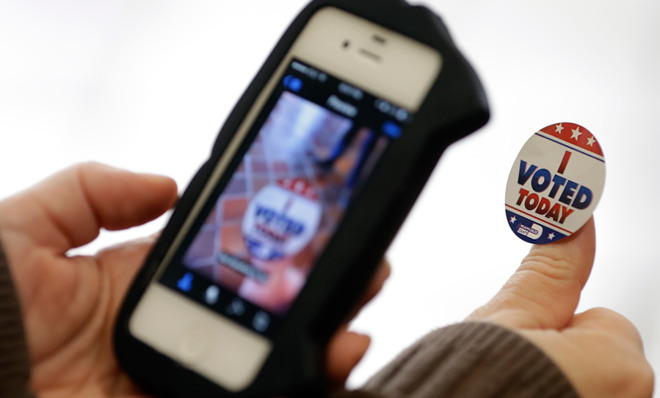The case for voting (even if America is a corrupt plutocracy rigged by the rich)
Voting won't solve all our problems. But it's an important first step.


With the approach of the 2014 midterms, perhaps the least consequential American election season in a generation, it's worth asking a perennial question: Should you even bother to vote?
Many people have basically given up on the democratic project, arguing that the American system is completely rigged by the rich and that nobody on the ballot truly represents their interests.
There's a lot of truth to this view. America is teetering toward plutocracy because the rich have schmoozed and donated their way to a politically favorable environment in which there are no options for expropriating 1 percenters for badly needed expansions of social insurance. No matter who wins the upcoming election, that won't change.
Subscribe to The Week
Escape your echo chamber. Get the facts behind the news, plus analysis from multiple perspectives.

Sign up for The Week's Free Newsletters
From our morning news briefing to a weekly Good News Newsletter, get the best of The Week delivered directly to your inbox.
From our morning news briefing to a weekly Good News Newsletter, get the best of The Week delivered directly to your inbox.
But voting is still worth doing.
Just look at the Democratic Party's increasingly desperate attempts to hold on to the Senate. They're working hard and spending gobs of money to try and get African-Americans to vote in Georgia, North Carolina, and elsewhere, because high turnout could be the difference between the status quo and a Senate led by Mitch McConnell (R-Ky.), one of the biggest shills for moneyed interests in Washington:
The Democratic Senatorial Campaign Committee has poured $60 million this year into its Bannock Street Project, a data-driven effort to target potential voters, then make sure they vote. In North Carolina, where Sen. Kay Hagan, a Democrat, is fighting to retain her seat, party field operatives have deputized more than 150 "captains" — the owners of black barbershops, hair salons, and other small businesses — to help register voters. Nearly 30,000 African-Americans have registered since January. [The New York Times]
Now, electing Democrats in those states won't necessarily improve things. After all, there are different types of Democrats. (Colorado's Mark Udall, for example, is worth a vote, while New York's Andrew Cuomo is not.) Hell, vote for a doomed protest candidate if you want. If the party hacks don't make a good case for themselves, then a protest vote is a strong signal that there are electoral veins to be mined by a challenger or third party.
Still, we know for a fact that low-turnout elections dominated by the enraged white paranoiacs of the Fox News set will definitely keep power in the hands of the rich. If America had a turnout rate of 100 percent, our political situation would look very different than it does now.
Voting in itself won't protect your rights or secure beneficial policies. But it is a key first step to getting there. As the British politician and activist Tony Benn once said, "I think democracy is the most revolutionary idea in the world. Far more revolutionary than socialist ideas or anybody else's ideas — because if you have power, you use it to meet the needs of you and your community."
He once expounded on these ideas in an interview with The Guardian discussing the Putney Debates, a 1647 discussion about a new English constitution and a key development in the history of Western democracy:
Benn was no starry-eyed dreamer — indeed, he openly questioned whether Britain or America were even worthy of the title "democracy." But as he also says, this is a fight that every generation has to fight. And the simple act of voting has to be part of it.
Look no further than Republican attempts across the country to disenfranchise voters and suppress Democratic efforts to register and organize black and brown voters. The fact that the party of organized money thinks the right to vote is worth taking away says that it must be worth quite a lot.
A free daily email with the biggest news stories of the day – and the best features from TheWeek.com
Ryan Cooper is a national correspondent at TheWeek.com. His work has appeared in the Washington Monthly, The New Republic, and the Washington Post.
-
 Sweden's Soft Hooligans: the fans who brought 'good vibes' to the Euros
Sweden's Soft Hooligans: the fans who brought 'good vibes' to the EurosUnder the Radar Formed to create a fun fan atmosphere, the Swedish football supporter group has been bringing the party to the championship
-
 Crossword: July 18, 2025
Crossword: July 18, 2025The Week's daily crossword
-
 Codeword: July 18, 2025
Codeword: July 18, 2025The Week's daily codeword puzzle
-
 The last words and final moments of 40 presidents
The last words and final moments of 40 presidentsThe Explainer Some are eloquent quotes worthy of the holders of the highest office in the nation, and others... aren't
-
 The JFK files: the truth at last?
The JFK files: the truth at last?In The Spotlight More than 64,000 previously classified documents relating the 1963 assassination of John F. Kennedy have been released by the Trump administration
-
 'Seriously, not literally': how should the world take Donald Trump?
'Seriously, not literally': how should the world take Donald Trump?Today's big question White House rhetoric and reality look likely to become increasingly blurred
-
 Will Trump's 'madman' strategy pay off?
Will Trump's 'madman' strategy pay off?Today's Big Question Incoming US president likes to seem unpredictable but, this time round, world leaders could be wise to his playbook
-
 Democrats vs. Republicans: which party are the billionaires backing?
Democrats vs. Republicans: which party are the billionaires backing?The Explainer Younger tech titans join 'boys' club throwing money and support' behind President Trump, while older plutocrats quietly rebuke new administration
-
 US election: where things stand with one week to go
US election: where things stand with one week to goThe Explainer Harris' lead in the polls has been narrowing in Trump's favour, but her campaign remains 'cautiously optimistic'
-
 Is Trump okay?
Is Trump okay?Today's Big Question Former president's mental fitness and alleged cognitive decline firmly back in the spotlight after 'bizarre' town hall event
-
 The life and times of Kamala Harris
The life and times of Kamala HarrisThe Explainer The vice-president is narrowly leading the race to become the next US president. How did she get to where she is now?
